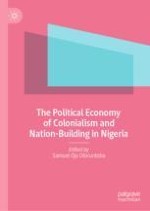2022 | OriginalPaper | Chapter
15. ECOWAS Protocol on Free Movement, Border Porosity, and the Emerging Threats to Human Security in North Central Nigeria: An Appraisal of the Influx of Migrant Fulani Herders
Authors : Dare Leke Idowu, Damilola Taiye Agbalajobi
Published in: The Political Economy of Colonialism and Nation-Building in Nigeria
Publisher: Springer International Publishing
Activate our intelligent search to find suitable subject content or patents.
Select sections of text to find matching patents with Artificial Intelligence. powered by
Select sections of text to find additional relevant content using AI-assisted search. powered by
